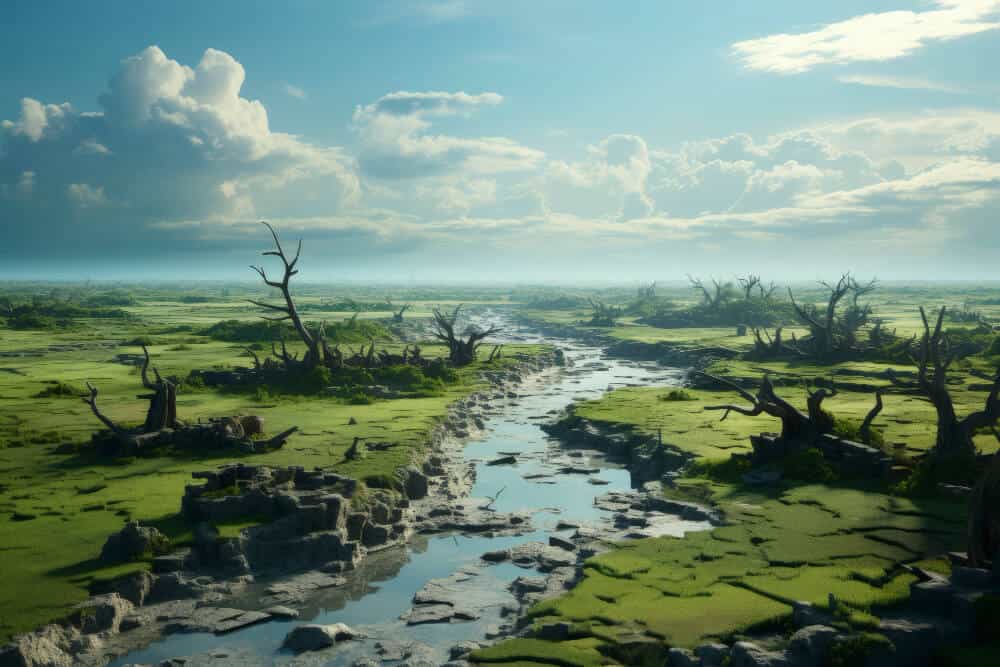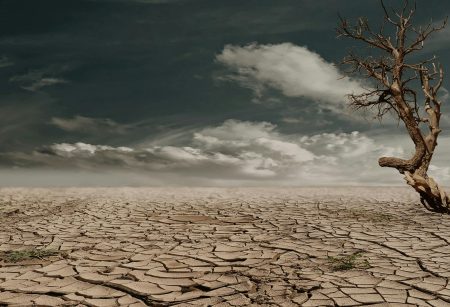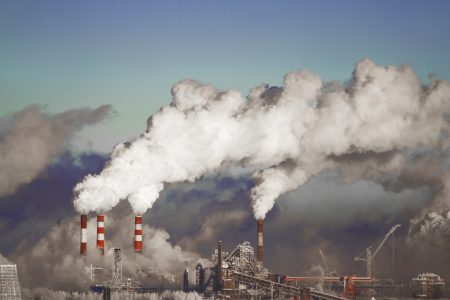
Deforestation refers to the clearing of trees and vegetation in a particular area. It leads to the permanent removal of forest cover, jeopardizing biodiversity and exacerbating climate change.
Ultimately, it disrupts ecosystems, contributes to soil erosion, and decreases the availability of essential resources. Moreover, deforestation is mainly driven by human activities such as agriculture expansion, logging, and urbanization. This essay explores the causes and impacts of deforestation, highlighting the urgent need for sustainable solutions and global cooperation to mitigate its detrimental effects on our planet.
By understanding the consequences of deforestation and taking action to preserve forests, we can ensure a more balanced and sustainable future for both humans and the natural environment.
 Deforestation is the process of clearing or removing trees from forests for various purposes. This widespread practice has detrimental effects on the environment, leading to habitat destruction, biodiversity loss, and climate change. It is crucial to address and combat deforestation to protect our planet’s ecosystems and ensure a sustainable future for all.
Deforestation is the process of clearing or removing trees from forests for various purposes. This widespread practice has detrimental effects on the environment, leading to habitat destruction, biodiversity loss, and climate change. It is crucial to address and combat deforestation to protect our planet’s ecosystems and ensure a sustainable future for all.
What Is Deforestation?
 Deforestation is the process of clearing or removing trees from forests for various purposes. This widespread practice has detrimental effects on the environment, leading to habitat destruction, biodiversity loss, and climate change. It is crucial to address and combat deforestation to protect our planet’s ecosystems and ensure a sustainable future for all.
Deforestation is the process of clearing or removing trees from forests for various purposes. This widespread practice has detrimental effects on the environment, leading to habitat destruction, biodiversity loss, and climate change. It is crucial to address and combat deforestation to protect our planet’s ecosystems and ensure a sustainable future for all.
Understanding Deforestation
Deforestation is the process of clearing or thinning out forests, leading to a significant loss of trees.-
- Decrease in Forest Area: Deforestation results in a decline in the total area covered by forests, impacting biodiversity.
-
- Impact on Climate: The removal of trees reduces the absorption of carbon dioxide, contributing to global warming.
-
- Disruption of Ecosystems: Deforestation disrupts the intricate balance of ecosystems, leading to loss of habitat for numerous species.
Why Does Deforestation Occur?
-
- Agriculture and Livestock: Clearing land for agriculture and livestock production is a primary cause of deforestation.
-
- Logging: Logging activities, both legal and illegal, contribute to the removal of trees at an alarming rate.
-
- Urbanization: The expanding urban areas result in the clearing of forests to make way for infrastructural development.
Effects Of Deforestation
-
- Soil Erosion: Deforestation can lead to soil erosion, reducing the fertility of the land and impacting agriculture.
-
- Loss of Biodiversity: The destruction of forests results in the loss of diverse plant and animal species.
-
- Climate Change: Deforestation plays a crucial role in climate change by releasing carbon stored in trees back into the atmosphere.
Solutions To Deforestation
-
- Reforestation: Planting new trees and restoring forest areas can help mitigate the impacts of deforestation.
-
- Sustainable Practices: Adopting sustainable farming and logging practices can help preserve forests for future generations.
-
- Conservation Efforts: Implementing protected areas and wildlife reserves can safeguard ecosystems from deforestation threats.
Deforestation And Climate Change
Deforestation accelerates climate change by releasing stored carbon and disrupting ecosystems. It leads to biodiversity loss and intensifies global warming, posing grave threats to the environment and biodiversity. The urgent need to address deforestation is crucial in combating climate change. Deforestation has become a major concern globally due to its significant impact on climate change. The removal of trees and forests leads to a variety of environmental issues, affecting the climate in multiple ways.How Deforestation Contributes To Climate Change
-
- Decreased Carbon Sinks:
-
- Forests act as carbon sinks, absorbing and storing carbon dioxide. Deforestation diminishes this natural process, leading to increased levels of CO2 in the atmosphere.
-
- Disruption of Water Cycle:
-
- Trees play a vital role in regulating the water cycle. Deforestation disturbs this process, resulting in altered rainfall patterns and contributing to climate instability.
-
- Soil Degradation:
-
- The removal of trees contributes to erosion and soil degradation, impacting the land’s ability to sequester carbon and further exacerbating climate change.
Impact On Biodiversity And Ecosystems
Deforestation not only affects climate change but also leads to the loss of biodiversity and disruption of ecosystems. The destruction of habitats and disruption of ecological balance further intensify the impacts of climate change. The link between deforestation and climate change underscores the urgency of addressing this issue. By promoting reforestation, sustainable land management, and conservation efforts, the detrimental effects on the climate and the environment can be mitigated.What Is The Scale Of Deforestation And Its Role In Climate Change?
Deforestation plays a significant role in climate change as it contributes to greenhouse gas emissions and loss of habitat. The scale of clear-cutting is alarming, with large areas of forests being cleared for agriculture, logging, and urbanization, leading to environmental imbalances and global warming. It is a significant environmental issue and plays a crucial role in climate change. Here, we’ll delve into the scale of deforestation and its impact on the planet.Effects Of Deforestation
Deforestation has drastic effects on the environment, including habitat loss for wildlife, increased carbon dioxide levels, soil erosion, and disrupted water cycles. It is crucial to address deforestation to protect biodiversity and mitigate climate change.- Loss of Biodiversity:
- Clear-cutting leads to the destruction of habitats for numerous plant and animal species, resulting in a significant loss of biodiversity.
- This disruption of ecosystems can lead to the extinction of endangered species and disrupt the delicate balance of nature.
- Climate Change Impact:
- Trees play a crucial role in absorbing carbon dioxide, a key greenhouse gas that contributes to global warming.
- It reduces the Earth’s capacity to mitigate climate change, leading to increased greenhouse gas emissions and further exacerbating the issue.
- Soil Degradation:
- The removal of trees through deforestation exposes the soil to erosion by wind and water.
- Without the protective canopy of trees, soil nutrients are depleted, leading to decreased fertility and productivity, impacting agriculture and local communities.
- Disruption of Water Cycles:
- Trees play a vital role in regulating the water cycle by absorbing and releasing water through transpiration.
- Deforestation disrupts this natural process, leading to altered rainfall patterns, decreased water quality, and increased risks of floods and droughts in affected regions.
- Social and Economic Consequences:
- It can have severe social and economic impacts on communities that rely on forests for their livelihoods.
- Loss of forests can result in food insecurity, displacement of indigenous populations, and loss of traditional knowledge and cultural heritage.
Takeaway
Deforestation has far-reaching effects on biodiversity, climate change, soil health, water cycles, and communities. It is essential to address the root causes of clear-cutting to mitigate these harmful consequences and work towards sustainable forest management practices.Effects Of Deforestation On The Environment
Deforestation has a profound impact on the environment, leading to habitat loss, disruption of ecosystems, and climate change. Trees play a crucial role in absorbing carbon dioxide and maintaining biodiversity. Their removal contributes to soil erosion, loss of wildlife, and increased greenhouse gas emissions. It is a critical issue that has severe consequences on the environment. By removing forests and trees, we disrupt the delicate balance of our ecosystems, leading to a range of adverse effects. In this section, we will explore the effects of clear-cutting on the environment and understand the gravity of its impact.Loss Of Biodiversity:
- Clear-cutting jeopardizes the rich biodiversity found in forests, causing the loss of numerous plant and animal species.
- Many species are dependent on the unique habitats provided by forests, and their extinction can disrupt the intricate web of life.
Increased Greenhouse Gas Emissions:
- Trees absorb carbon dioxide during photosynthesis, acting as a natural carbon sink.
- When forests are cleared, this carbon dioxide is released back into the atmosphere, contributing to the greenhouse effect and global warming.
Soil Erosion:
- Deforestation removes the protective cover of trees, exposing the soil to the erosive forces of wind and water.
- Without trees to anchor the soil, it becomes prone to erosion, leading to a loss of valuable topsoil and nutrient depletion.
Disruption Of Water Cycle:
- Forests play a vital role in maintaining the water cycle by regulating rainfall patterns and reducing runoff.
- Clear-cutting disrupts this cycle, potentially leading to droughts, floods, and altered water availability in affected regions.
Impact On Indigenous Communities:
- Many indigenous communities rely on forests for their livelihoods and cultural practices.
- It’s threatens their way of life, displacing communities and eroding their traditional knowledge and connection to the land.
Increased Flooding And Landslides:
- Without the roots of trees to anchor the soil, deforested areas become susceptible to landslides and flooding during heavy rainfall.
- Flooding and landslides can cause significant damage to infrastructure, homes, and lives.
Loss Of Medicinal Resources:
- Forests are home to a rich diversity of plants with medicinal properties.
- It is not only eliminates potential sources of life-saving drugs but also hinders future discoveries and advancements in medical treatments.
Climate Change Effects:
- Deforestation contributes to climate change by reducing the Earth’s capacity to regulate temperature and weather patterns.
- A warmer climate can have far-reaching consequences, impacting agriculture, water resources, and the overall stability of ecosystems.
Disruption Of Natural Carbon Sequestration:
- Forests act as natural carbon sinks, storing vast amounts of carbon and helping mitigate climate change.
- clear-cutting disrupts this natural cycle, reducing the Earth’s capacity to absorb and store carbon dioxide.
Desertification:
- Deforestation can lead to desertification, turning once productive and fertile land into arid wastelands.
- Without the protective cover of trees, the soil dries out, loses nutrients, and becomes unsuitable for vegetation to thrive.



